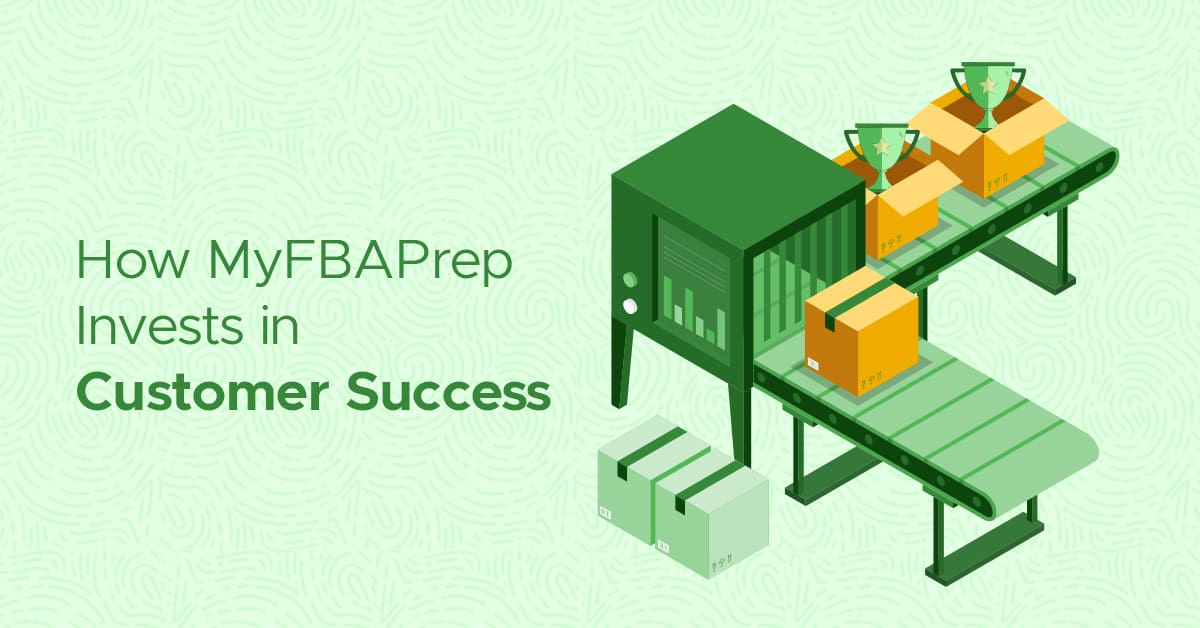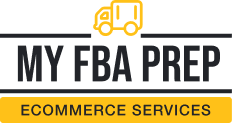
Issue 123: See the FBA prep machinery our customers use

Hello, MyFBAPrep Sellers!
MyFBAPrep invests in our customer’s success, and there’s no better way to showcase it than sharing the custom FBA prep machinery we’ve acquired on behalf of our sellers. Learn how we optimize FBA prep, all about FBM, how to kit Amazon products, and much more in today’s newsletter.
P.S. Have you heard the good news? Amazon has released their 2025 fees and it’s looking positive for sellers.
How We Utilize Custom Machinery to Optimize Your Logistics
If you’re not already using custom machinery in your FBA prep process, then now is the time. With specialized tools uniquely designed and deployed for your brand’s processes, you can accelerate turnaround times, improve bundling, and prepare your business to scale, for example.
Setting up and integrating custom machinery into your current workflows, however, can be a cumbersome process—that’s where we step in.
At MyFBAPrep, we’ve acquired and set up specialized tools and custom machinery for customers in diverse industries, from health and beauty to food, apparel, and much more.
Here’s a look at how custom machinery can optimize your logistics process and what we can do to help.
See eight specialized tools to optimize your logistics.
How to Become an Amazon FBA Seller: A Complete Guide
Tapping into the eCommerce giant’s global logistics infrastructure can be a game-changer, but how do you become an Amazon FBA seller, and is it the right move for your business?
To answer these pressing questions, we’ll walk you through everything you need to know about the program, from the fundamentals of FBA to scaling your Amazon business.
Is becoming an FBA seller right for you?
TikTok Shop Fulfillment: How TikTok Is Revolutionizing eCommerce and Leveraging Amazon MCF
One of the key pain points for brands scaling on TikTok is fulfillment: how do you meet the demands of a hyper-engaged audience with lightning-fast shipping expectations? That’s where Amazon’s Multi-Channel Fulfillment (MCF) comes into play.
MCF allows brands to store their inventory in Amazon fulfillment centers and use Amazon’s logistics network to fulfill orders from any channel – not just Amazon. Whether customers buy through TikTok Shop, your website, or another marketplace, Amazon handles the heavy lifting.
Here’s what MCF offers:
- Inventory Storage: Your products are stored in Amazon’s vast network of fulfillment centers.
- Order Fulfillment: When an order is placed on TikTok Shop, it’s automatically sent to Amazon MCF for picking, packing, and shipping.
- Fast Delivery: Amazon’s logistics power ensures quick and reliable delivery to your customers.
- Neutral Packaging: The orders fulfilled through MCF arrive in unbranded packaging, maintaining your brand’s identity.
For TikTok sellers, this integration is a game-changer. It combines TikTok’s viral sales potential with Amazon’s operational expertise, bridging the gap between demand generation and fulfillment.
Learn how to optimize your TikTok Shop fulfillment with Amazon MCF.
Stay agile his Q4 with lightning fast FBA prep
Need some help augmenting your Q4 logistics? Not sure if your current warehouse has capacity or the ability to scale with your peak sales? Work with MyFBAPrep’s global network of logistics experts and access reliable, professional kitting, bundling, co-packing, and more.
Access Our Robust Suite of Logistics Services
Amazon Fulfilled By Merchant 101: Everything You Ever Wanted to Know
Sellers on Amazon have two main choices for their order fulfillment: Fulfillment by Amazon (FBA) or Amazon Fulfilled by Merchant (FBM). To navigate the vast marketplace successfully, it’s critical to build the right strategy around these models.
Although FBA is the more popular option (a whopping 82% of sellers use it), Amazon Fulfilled By Merchant presents several unique advantages. Understanding its strengths and weaknesses will enable you to make informed decisions about how best to manage your eCommerce business through the program.
If you previously used FBA exclusively or are still learning how to tackle logistics yourself, this Amazon Fulfilled By Merchant guide is for you. Fulfilling your own orders can be complicated, since you have to deal with:
- Amazon prep guidelines
- Finding a reliable third-party logistics provider (3PL)
- Customer service
- Tracking
- Returns
- And more
Having to juggle these elements, it’s no wonder many Amazon Fulfilled By Merchant sellers feel overwhelmed. The good news is, you can avoid the chaos — if you know what you’re doing.
Benefits of Kitting Your Amazon Products
Whether you sell exclusively through FBA or also employ Fulfilled by Merchant, bundling and kitting for Amazon products can save you a great deal in several ways.
Cut FBA prep time
FBA packaging and labeling is time intensive and has strict regulations. When you combine multiple products, you reduce the packing materials and labels you use. For example, a three-pack of multi-vitamins requires only one-third of the bagging and labels that selling three bottles separately would. In turn, that’ll reduce FBA prep time and costs.
Reduce storage expenses
FBA charges a cubic foot rate based on product size and weight. It’s a flat $0.78 per cubic foot for most of the year, then increases to $2.40 per cubic foot during Q4. If you shrink-wrap items together and kit them as a single product, you’ll need much less space per item and so save on storage expenses.
Lower fulfillment costs
Amazon charges a fixed fulfillment cost per order. At 2024 rates, you’ll pay $3.60 per item to ship a 16 oz bottle of shampoo — or $6.62 for a three-pack. Further, if you package smaller items, such as a set of thread spools, with a larger product like a sewing machine, you might pay as little as $0.08 for fulfillment for the additional items. That can make selling those small add-ons worthwhile, or at least give you room to offer a larger discount to incentivize a purchase.
Boost shopping cart values
If you can sell a three-pack for $20 or a single unit at $8 and make the same profit per item, your bundle has still successfully raised your shopping cart value. That translates to lower costs and a higher ROI for your marketing and advertising.
Open sales to new markets
Expand to new markets with attractive bundles and kitting for Amazon products that don’t eat into your profit margins. You’ll have to research each market to understand what niches are available and then build bundles and kits to cater to them. Think travelers’ bundles, starter packs, repair and upgrade kits, etc.
Marketing
Bundles and kitting for Amazon products can be a market differentiator on Amazon. For instance, you might not have the Featured Offer placement for a single product, but you could be the only seller with two- and four-packs of the same item at a discount. These offerings can also increase brand visibility across a category and product search, which boosts your marketing efforts.
Get the best practices for kitting products for Amazon.
Why to Use a Kitting Warehouse for Amazon Prep
Need some help getting your Amazon kitting done?
When you contract with a kitting warehouse service, experienced personnel carefully prepare items, assemble and package them together, and then label and store them appropriately. That can occur on demand or in bulk to prep gift sets and kits for sales periods or FBA.
However, while outsourcing this process entails finding a 3PL that can offer that hands-on service, it adds significant value to your supply chain:
- Your provider can receive inventory directly from your manufacturer or supplier into their warehouse and prep them there.
- A kitting warehouse is equipped with specialized machinery to speed up kitting and reduce costs.
- Kits can be automatically sorted into inventory with no additional steps after packaging and labeling are complete.
- A kitting warehouse has staff on hand to process and handle kitting, even in bulk, without training new employees or bringing in extra people to handle acute spikes in demand volume.
Ultimately, a kitting warehouse can offer specialized prep at a lower cost and higher quality than your business could internally.
Get the pros and cons of using a kitting warehouse for Amazon.
Partner Spotlight 📣 EcomBalance
Sick of bookkeeping? Get it off your plate.
- EcomBalance is a reliable, professional bookkeeper for your eCommerce business.
- Reports are delivered by the 15th each month so you can analyze your numbers and grow smarter. See a sample report here.
- You get a dedicated eCommerce bookkeeper to answer any questions you have.
Access catch up services to help if you’re behind so you don’t have to worry about it.
Get One Month of Free Bookkeeping Services
Top Industry News
Shopify Stock Falls As Black Friday E-Commerce Volume Jumps 22% To $5 Billion (Investor’s Business Daily)
Shopify reported $5 billion in Black Friday gross merchandise volume, up 22% year-over-year, in line with last year’s growth.
Black Friday Spending Approaches $11 Billion Fueled by eCommerce (PYMNTS)
Black Friday shoppers spent a record $10.8 billion this year, primarily via online purchase. A report Monday (Dec. 2) from NPR — citing data from Adobe Analytics — notes that this figure is 10% higher than last year’s total, and double the amount of spending from 2017. Between 10 a.m. and 2 p.m. Friday, online shoppers spent $11.3 million per minute.
Cyber Weekend eCommerce Sales Grow 5.8% Year Over Year (Digital Commerce 360)
The record-breaking spending trend continued into Cyber Weekend — the Saturday and Sunday following Thanksgiving and Black Friday — as U.S. ecommerce sales once again hit new highs, according to new data from Adobe Analytics. On Small Business Saturday and the subsequent Sunday, consumers spent a combined $10.9 billion online. That’s up 5.8% year over year.
Holiday eCommerce Start Surpasses Record-breaking Forecast (MarTech Cube)
Ecommerce holiday spending is higher than anticipated, according to Adobe Analytics. For the first 24 days of November, U.S. ecommerce sales were up 9.6% year-over-year. This exceeds the record-breaking 8.4% increase expected for the entire 2024 holiday shopping season.
Prosus Bets on AI to Lift Growth After E-Commerce Revenue Boost (WSJ)
Prosus is banking on artificial intelligence to fuel growth after revenue climbed in the first half of its fiscal year, boosted by strong growth in its core e-commerce businesses. AI is contributing significantly to the company’s current growth, Chief Executive Fabricio Bloisi said in an interview. The Dutch investment group—which focuses on consumer internet companies—said it had troves of data from billions of transactions across its portfolio that allowed it to train AI models.
Amazon And Walmart Dominate Black Friday As Online Sales Soar 14.6% (Bezinga)
Black Friday sales in the U.S. revealed contrasting trends between in-store and online shopping, highlighting consumers’ preference for digital platforms. While brick-and-mortar stores saw muted growth of just 0.7% year-over-year, online sales surged by 14.6%, according to Mastercard SpendingPulse data. The figures underscore the growing dominance of e-commerce in the holiday shopping season, Reuters reports.
Why Amazon Sellers and Retailers are Flocking to TikTok Shop Despite Looming U.S. Ban (CNBC)
Via a dedicated Shop tab, retailers big and small promote products of all kinds, ranging from eyeshadow palettes, phone chargers, detox teas, treadmills and more. On TikTok, retailers typically offer generous coupons and free delivery within a few days. Shoppable posts, which look like normal videos but are ads for products sold in TikTok Shop, frequently appear in TikTok’s main video feed, known as the “For You” page.
Until next time,
Rachel Andrea Go
Marketing Director, MyFBAPrep
